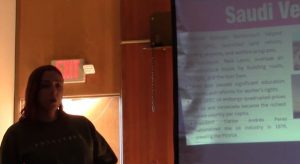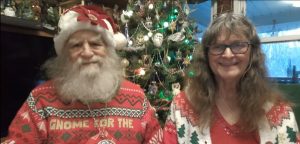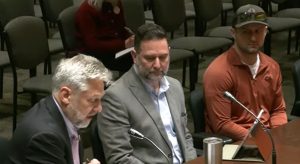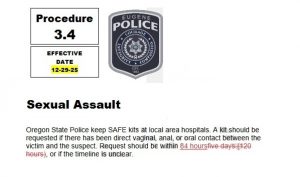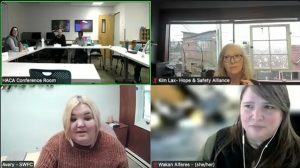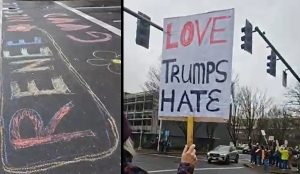How to interrupt peer suicide plans May 26-28
7 min read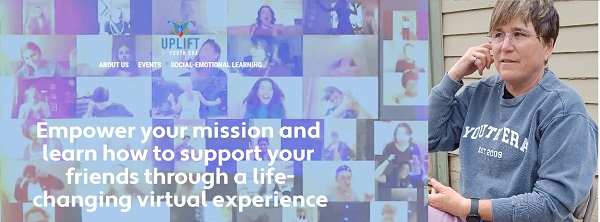
Learn how to interrupt your friends’ plans for suicide. Free training starts at 5 p.m. May 26, in an amazing virtual experience for Oregon youth hosted from a specially-built studio next to the McDonald Theater.
[00:00:12] The Youth Radio Project interviews Maj Bonnet. From Network Charter School in Eugene:
[00:00:19] Pandora: Just to start off, what is Uplift in your own words? Why was it started ?
[00:00:23] Maj Bonnet: It is a program where teens teach teens how to interrupt each other’s suicide plans. And what to do in a crisis.
[00:00:35] During the pandemic, when we were all in shutdown, teen suicide went through the roof and Oxford University reached out to us and said, ‘Can you design a program that’s virtual, that we can reach teens in their homes during this pandemic that will show tangible mental health benefits?’
[00:00:53] And so it was started to address the mental health crisis that teens were experiencing during the pandemic.
[00:00:59] Pandora: Nice. How do you help other teens empower other teens?
[00:01:05] Maj Bonnet: Yeah, that’s a great question. It’s grounded in this concept of peer support. The bulk of the time is spent in breakout rooms with my ambassadors, or as I call them, the ambassadorables. They run the breakout groups, and so you go into the same breakout group each of the three or four days, and you are met by a teen, or a team of teens, who are 14- to 19-year-olds and are trained.
[00:01:29] And so what youth have said to them and to me is, they feel much more comfortable talking about their lives with someone that they know understands from the inside out. Like, obviously, I was a teen, but I didn’t grow up with school shootings, for example, I didn’t grow up in the pandemic either. And so those two pieces just alone means that my trained ambassadorables are extremely more qualified to run groups with teens than I am, who’ve been doing this work for 30 years with teens.
[00:02:00] And I’m considered an expert, but they’re an expert in their experience.
[00:02:05] And teens coming into Uplift are much more comfortable talking in a group. So all those breakout rooms, there’s no adults in them, and they love that. And the teens are really good at what they do. They’re not just a young person thrown in a room. They go through a full day training. And I meet with them weekly for several months before they become a trained group leader. And they work with an experienced person and a trainee.
[00:02:31] So our whole program is set up based on the idea that everybody’s growing, nobody’s on their own. And they know they can call on me to pop into a room if I need it, but…they’re amazing.
[00:02:44] And so what grew as this youth leadership peer support thing has now turned into, now they are the official youth advisory council for all of Youth Era. So across all the services, if somebody needs to get a teen perspective, they come to the Monday night ambassadorable meeting and talk to the experts.
[00:03:04] Pandora: How does a teen get involved in Uplift?
[00:03:06] Maj Bonnet: The website, our general website is UpliftPeers.com. And our next event, which is our last school-year event that’s funded by the Oregon Health Authority, is May 26 through May 28, so the 26th is a school day, so it’s 5 p.m. to 8 p.m.
[00:03:25] And you zoom in, not just from around Oregon. We have folks coming from London, Nairobi, Canada, and other parts of the U.S., but the Oregon Health Authority is funding it for free for youth from Oregon.
[00:03:38] So the Friday night is 5 p.m. to 8 p.m., and then Saturday, Sunday is 11 a.m. to 3:30 p.m. And if you do all three days you get a $75 Amazon gift card.
[00:03:48] It’s not a drawing, it’s just acknowledging that you’re investing your time in changing the world and we want to say thanks. ( Wow.)
[00:03:55] There’ll be 300 to 500 youth registered, and the only ones who qualify for the grand prize are people who are participating in all three days. Whatever the cost of the grand prize is, you can get it as an Amazon gift card and use it to buy some other electronic thing, like a laptop, which was what the last person chose to get.
[00:04:15] And you have the opportunity to become an ambassadorable. Youth have used it to get into colleges, get jobs, two of them just got full ride. One got a full ride to a school in Ohio and one just got a $45,000 four-year scholarship to Willamette University. And doing references is a big piece of what I love to do this time of year.
[00:04:35] Pandora: Wow. That’s great.
[00:04:37] Maj Bonnet: Yep. People come for the stipend, but they say for the community. Yeah. Because they say they haven’t felt anything like this.
[00:04:45] For example, like think rural Oregon, like you’re here in Eugene and your school is very friendly and the community is pretty welcoming. So let’s assume like we have the demographics of Oregon are the last time they did an 11th grade survey:
[00:05:00] I think it was somewhere around 10 to 15% identified on the survey as LGBTQ; our participants are, on every given event, anywhere from 40 to 50% identify. Oregon is about 6% folks identify as having a disability; our last event was 12%. And Oregon is about 75% white, in terms of the demographics of youth; our participants, the last event was 45% white and 55% identified as non-white.
[00:05:31] And that’s not an accident. That’s intentional, because of my outreach and the outreach of the ambassadors. So we know that suicide affects groups not the same. It’s disproportionate towards, the highest suicide risk is Indigenous and Native youth on reservations. The next is queer and trans youth. And so those are my two top priorities.
[00:05:52] And then youth of color, youth with disabilities. And so it doesn’t mean that if you don’t identify in one of those groups, you aren’t completely welcome. You absolutely are. We’re just saying that youth are disproportionately impacted by mental health crisis, socioeconomics, and suicide, and we want to make sure, and so our demographics reflect our outreach.
[00:06:12] And so with that in mind, think about, like, we have an ambassador in Heppner, rural Oregon, we’ve had another one on the Oregon coast, both who identify as part of the LGBTQ community and do not feel supported in their communities. They can Zoom in, participate in this event, and then stay connected to other youth.
[00:06:31] In rural parts of Oregon where they might be the one black youth or the one youth with a disability, we want them to know that they can come here and be part of a community where they are not the one youth, they’re a part of a group, and that they can stay connected to that group because that is one of the things that creates resiliency against things like suicide is knowing that you’re not alone and you have people to talk to that understand.
[00:06:54] Pandora: That’s a beautiful thing… so thank you.
[00:06:56] Maj Bonnet: You’re welcome. And we talk specifically about that moment when somebody says to you, ‘Something terrible’s going on, I need to tell you something. But first, promise you won’t tell anyone.’
[00:07:06] At that point, we train people to say, ‘There are some things that I can’t keep a secret. If somebody’s hurting you, if you’re going to hurt yourself, I can’t keep that a secret. I need to do something or tell someone.’
[00:07:17] So we talk about that really openly, like, the difference between trying to save a friendship versus saving a life. And ultimately if you don’t save a life, the friendship isn’t saved either.
[00:07:28] And so that thing where people say, ‘The suicide happened and nobody knew.’ Well, we know that’s not true. At least one teen knew, often more, and they didn’t know what to do. And now they’re carrying that. Like: ‘Oh my gosh, I knew, but I didn’t know what to say or what to do, and now it’s too late, and what do I do now?’ And so that’s where it can be contagious too, you know?
[00:07:51] And so we created a campaign called ‘Ask a Question,’ and that is just a really simple concept, which is: If you think someone’s in trouble, like they’re like, they start giving away all their stuff; they won’t leave their room; they just had a relationship end; they won’t go to school; you can tell they’re in the same clothes they’ve been in for three days.
[00:08:10] What we’re teaching people is to ask a question like, ‘Are you okay?’ ‘Yeah, I’m fine.’ ‘But you don’t seem fine. Tell me what’s going on.’ Ask.
[00:08:18] They’re like, ‘Well, I just don’t, I want to go to sleep and not wake up.’ And then what to do with that? So somebody just said, ‘I’m in real trouble,’ you know? That isn’t like I’m asking for attention or I’m trying to be dramatic. That’s a real danger sign.
[00:08:31] And we want—just like first-aid classes, you can take a first-aid class so that if somebody has a heart attack, you know what to do. The other short version of what is Uplift is the teens have described it this way: It’s an emotional first-aid class so that you know what to do in a real life-and-death crisis.
It’s: ‘I broke up with my boyfriend and he said he’s going to kill himself.’ This is that class, you know?
[00:08:56] This is part of my life mission, is to end teen suicide by working with teenagers, working with young people who will eventually be in their 20s. But the suicide issue doesn’t end when you suddenly become 20. The young adult from 14 to 26 is a real high-risk group. And so this is going to be an ongoing issue.
[00:09:18] John Q: Free training in peer support with a chance to win a PS5. For more, see YouthEra.org or UpliftPeers.org.

